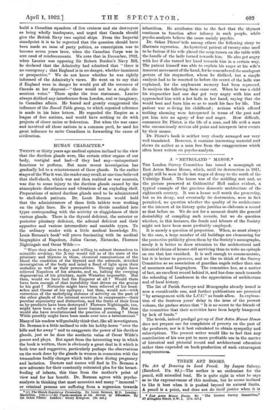HUMAN CHARACTER.*
TWENTY or thirty years ago medical opinion inclined to the view that the ductless glands were, like certain other-organs of our body, vestigial and had—if they had any—unimportant
functions to perform. But more recent investigation has gradually led to a reinstatement of these glands. In the earlier stages of the War it was, the reader may recall, at one time believed that shell-shock, which was not then realized as war neurosis, was due to some injury to the ductless glands caused by the atmospheric disturbances and vibrations of an exploding shelL Preparations of mixed ductless glands used to be administered to shell-shock patients. Dr. Louis Berman would hold that the administrators of these little tablets were working on the right lines. He is prepared to divide mankind into types corresponding with the activity or sluggishness of their various glands. There is the thyroid deficient, the anterior or posterior pituitary deficient, the adrenal deficient and their opposites and various intermediate and unstable types. To
the ordinary reader with a little medical knowledge Dr. Louis Berman's books will prove fascinating with its medical
biographies of Napoleon, Julius Caesar, Nietzsche, Florence Nightingale and Oscar Wilde :-
"Were they alive to-day, and willing to submit themselves to scientific scrutiny, the X-ray would tell us of the state of the pituitary and thymus in them, chemical examinations of the blood the condition of the thyroid and the adrenals, detailed investigation of the body and mind a Rood of light upon their maladies as well as their personalities. Therapy might have relieved Napoleon of his attacks, and so, halting the creeping degeneration of his pituitary, made Waterloo impossible. But then, would we have had the Emperor at all ? Would there have been enough of that instability that drives on the genius to his goal? Nietzsche might have been relieved of his head- aches and Caesar of his epilepsy ; but then, would not—with correction of the underlying streams of activity on the part of the other glands of the internal secretion to compensate—their peculiar superiority and distinction, and the fruits of their lives as by-products have been destroyed ? Florence Nightingale, too, might have been a softer and more human person. But then would she have revolutionized the practice of nursing ? Oscar Wilde possibly might have been made over into a heterosexual."
Many of his readers will probably think that, like all investigators, Dr. Berman is a little inclined to ride his hobby-horse " over the hills and far sway " and to exaggerate the power of his ductless glands, just as he does the aesthetic value. of Oscar Wilde's poems and plays. But apart from the interesting way in which the book is written, there is obviously a great deal in it which is both true and suggestive, particularly perhaps the observations on the work done by the glands in women in connexion with the tremendous bodily changes which take place during pregnancy and lactation. Doctors and nurses will find in Dr. Berman a new advocate for their constantly reiterated plea for the breast-
feeding of infants, this time from the mother's point of view and for her benefit. Dr. Berman agrees with psycho- analysts in thinking that most neurotics and many " immoral " or criminal persons are suffering from a regression towards • (1) The Glands Regulating Personality. By Louis Berman, M.D. Landau . Macmillan. [18a.]—(2) Psycho-analysis in the Service of Education. By Dr. Oskar kiister. London ; Henry Bimpton. Ns. net.1
infantilism. He attributes this to the fad that the thymub continues to function after infancy in such people, while psycho-analysts believe the cause mainly psychic. Dr. Oskar Pfister' tells among others the following story to illustrate regression. An hysterical patient of twenty-nine used to be furious if his wife placed the soup tureen on the table with the handle of the ladle turned towards him. He also got angry with her if she turned her hand towards him in a certain way. The patient himself was able to explain his anger at his wife's innocent movement of the hand, for he remembered the analogowi gesture of his stepmother, whom he disliked, but a simple analysis had to be resorted to before the secret of the ladle was explained, for the unpleasant memory had been repressed. In analysis the following facts came out. When he was a child his stepmother had one day got very angry with him and approached him with a hot ladle in her band, saying that she would beat and burn him so as to mark his face for life. The patient was re-living his childhood ; actions which offered nothing alarming were interpreted in terms of the past and put him into an agony of fear and anger. How difficult, comments Dr. Pfister, is the life of a man, and life with a man who unconsciously revives old pains and interprets later events by their means.
Dr. Pfister's book is neither very clearly arranged nor very well translated. However, it contains interesting material and shows its author as a man free from the exaggerations which often beset writers on psycho-analysis.


































 Previous page
Previous page